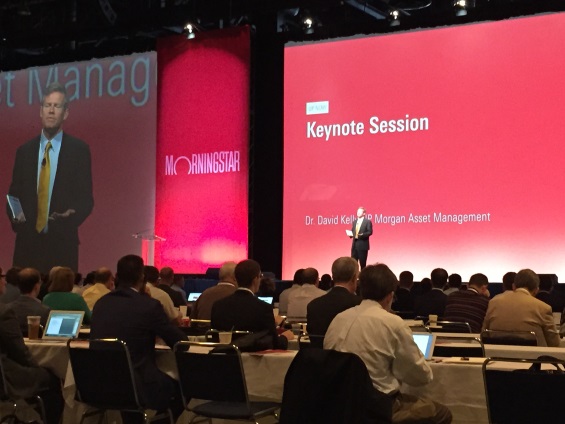Kelly: U.S. Is Bouncing Back
Auto sales, housing starts, labor market indicators, and the stabilization of capital goods orders point to growth for the rest of the year, says J.P. Morgan Asset Management chief global strategist David Kelly.
J.P. Morgan Asset Management chief global strategist David Kelly kicked off day two of the Morningstar Investment Conference by giving a relatively upbeat assessment of the U.S. economy and encouraging people to stay invested.
Kelly sees the 0.2% contraction in first-quarter GDP as being a measurement error and the result of bad weather, versus a sign that the economy is headed toward recession. He pointed to bright spots in auto sales, housing starts, labor market indicators, and stabilization of capital goods orders as signs of growth for the rest of the year.
This improving growth will likely lead to the Fed tightening later this year, but Kelly thinks that the Fed may already be behind the ball and may have to raise rates faster than it currently expects. He said the Fed's belief that there is still slack in the economy is a key error. Kelly, on the other hand, thinks we are "running out of available workers, quickly." He said the decline in the labor market participation rate is being driven mainly by demographics, while a host of other social issues from prescription drug abuse to felony convictions are also keeping people out of the workforce.

But a rising rate environment is no reason to abandon the stock market. First off, Kelly thinks that earnings growth is currently being depressed by temporary issues like falling energy prices and a weak dollar. He thinks U.S. earnings growth could bounce back from 0% in 2015 to 10% in 2016 and sees oil coming back somewhat (if not back to where it was) as supply and demand rebalance. He also sees the dollar as overvalued and that, over time, we're likely to see the dollar fall, helping U.S. earnings. Second, J.P. Morgan's research has shown that historically stocks sell off somewhat when rates begin to rise but then quickly rebound.
He also isn't worried about current valuation levels. He sees U.S. stocks as selling at above-average prices on an absolute basis but not at outrageous levels. He was more optimistic about European equities, seeing lots of room for earnings growth over the medium term. In emerging markets, he expects good long-term growth as valuations rise over time.
This assessment, though, doesn't mean that investors shouldn't be selective. He thinks sectors with less interest rate sensitivity (like technology and financial services) are going to be better performers than those that are quite sensitive (like REITs and utilities).
Kelly is less sanguine about the prospects for fixed-income investors. He thinks that the rising rate environment will result in capital loss in the U.S. Treasury market. He recommended investors diversify their bond holdings to include Europe and some emerging markets to help guard against this, as global central banks seem unlikely to raise rates anytime soon.
His overall advice was to stay invested and to stay diversified. In a quantitative-easing driven world with artificially low rates, staying in cash can create a false sense of security, he said. There may not be a ton of screaming values across the investment world, but there are enough opportunities across the globe to build long-term value.

/s3.amazonaws.com/arc-authors/morningstar/96d7bd4e-92b9-4928-87ef-a13a06b394fa.jpg)
/cloudfront-us-east-1.images.arcpublishing.com/morningstar/FGC25JIKZ5EATCXF265D56SZTE.jpg)
/d10o6nnig0wrdw.cloudfront.net/04-25-2024/t_d30270f760794625a1e74b94c0d352af_name_file_960x540_1600_v4_.jpg)
/cloudfront-us-east-1.images.arcpublishing.com/morningstar/DOXM5RLEKJHX5B6OIEWSUMX6X4.png)
:quality(80)/s3.amazonaws.com/arc-authors/morningstar/96d7bd4e-92b9-4928-87ef-a13a06b394fa.jpg)